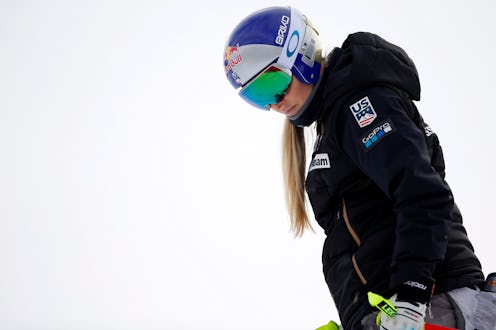Life
The Amount Of Food Winter Olympians Eat In A Day Is About To Make You Hecka Hungry

Watching people dart around ice rinks and whoosh down snowy slopes at speeds approaching the sound barrier, we all end up wondering the same thing: How much do Olympic athletes eat? How many calories does it take to fuel the feats of physical prowess that earn you a place on Team USA? I know this will come as a shock, but the answer is "a lot." There you have it. End of story.
Just kidding. You may remember that in 2008, swimmer Michael Phelps supposedly ate 12,000 calories a day in preparation for events in the Beijing Olympics, packing away entire pizzas in one sitting. He later told USA Today's For the Win that this was a myth — at his peak, he said he was eating a mere 8,000 to 10,000 calories a day. (Life goals?) This is, obviously, still a huge amount of calories for one person to consume in 24 hours, but not every athlete eats quite so much. An Olympic diet varies depending on the sport; athletes whose skills depend on being light and quick, like skiiers, eat differently than the ones who benefit from muscle mass, like shot putters.
According to NPR, people in endurance sports like cross-country skiing tend to load up on carbohydrates right before the big event. There's a huge variety in how much they eat, which can range from 3,000 to 8,000 calories per day. Ideally, they would get these calories from a mix of lean proteins, whole grains, and fresh fruits and vegetables, but even professional athletes are struck by cravings sometimes. Jessie Diggins, a Team USA cross-country skiier you'll see at the PyeongChang games, told Elite Daily that after a "'quick' five hour workout," she likes to indulge in homemade banana bread. Meanwhile, snowboarding legend Shaun White just can't seem to stay away from Americanized Chinese food.
Speed skating races may not take as long as cross-country skiing, but it still requires tons of energy. After the Sochi Olympics in 2014, short-track skater Jessica Smith told Shape that between meals, she snacks on protein-rich foods like hard-boiled eggs and yogurt, and on race day, she makes sure to eat between events. "If you don’t eat, it not only hinders you that day, but it also takes a toll on you the next day," she told the magazine.
Similarly, power sports like bobsledding require athletes to consume high amounts of protein every day. In 2013, Lolo Jones reportedly ate 9,000 calories a day to gain muscle mass before the Sochi Olympics the next year, chowing down on protein shakes and bacon cheeseburgers regularly.
Athletes on team sports like hockey, which requires quick bursts of activity, tend to eat between 3,000 and 4,500 calories a day. In 2014, the sports dietitian for the U.S. women's hockey team stressed the importance of clean eating and using food for nutritional value. She told TIME magazine that she asked the players to eat fresh fruits and greens, fish, and lean meats, and beans, which provide much-needed iron. But all that activity requires tons of protein, which is why hockey players tend to snack on protein shakes or chocolate milk between meals.
On the other end of the spectrum, "aesthetic" sports like figure skating and ice dancing often lead athletes to restrict their food intake in an effort to stay lean. Sports dietician Jennifer Gibson told E! Online that figure skaters may eat between 1,800 and 2,000 calories a day, despite their intense physical activity. It's worth noting that eating disorders afflict a substantial portion of these athletes. Japanese skater Akiko Suzuki recently spoke publicly about her struggle with anorexia nervosa, and U.S. skater Gracie Gold withdrew from the 2018 Olympics to undergo treatment for an eating disorder, among other illnesses.
In the end, each Olympian's diet comes down to what works for them — which usually means eating much more than the average person. But while each athlete may carefully regulate what they eat, they've been known to snack on the same kind of junk food we all crave sometimes. Despite appearances, they're only human.